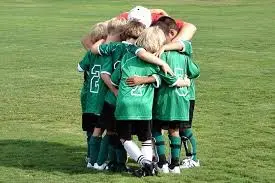
Feb 27, 2018 • 4 min read
The Inner and Outer Journey of Youth Sports
Posted in:
“I want to be a Major League Baseball Player.” “I want to play in the NBA.” “I want to make it to the NFL.” – Anonymous kids.
When one of my young students tells me his goal is to be a professional baseball player, my response is always the same: “Let’s get to work.”
Instead of squashing a kid’s dream, let’s focus on something even more important than the goal itself: understanding the process associated with achieving one’s goals. Not only will this increase your odds of realizing your dreams, but the hard work you put in along the way will not be wasted even if your ultimate goal eludes you.
When we understand the process, success is achievable.
The martial arts model is a great example of the inner/outer journey. To legitimately reach the level of black belt in karate, it requires a certain mastery of technique associated with a complete system of training. As a student moves forward toward their goal of a black belt, they must be patient enough to master the movements at their current level before being taught more advanced movements. Whether it’s physical or academic training, understanding the concept of “one step at a time” is crucial for the development of mind and body.
Once we know where we want to go, how do we get there? First, visualize your “outer journey” which is, I want to do this — or that. Then, get to work.
Our everyday effort, week by week — month by month — year by year, represents our inner journey and it is where many of us fall short. When striving for high goals, progress can feel slow and if it feels like you’re not getting anywhere you should ask yourself this question: am I skipping steps along the way on my inner journey? This is the time to be honest with yourself because time passes quickly and you don’t get it back.
The outer journey lets you know where you’re going. But just knowing where you want to go won’t get you there. You need a map and you need the discipline to stay the course. You also need the awareness to change course as needed, making sure your change of direction isn’t just a shortcut, but a logical progression based on the shifting dynamic.

The main purpose of youth sports shouldn’t be about becoming a professional. The low percentage of success speaks for itself. But what we are witnessing in youth sports these days is professionalization, causing a trend toward the advanced training of kids before crucial developmental stages have reached their peak. When this happens, your training becomes like a chain with weak links. It looks like a chain, but it won’t hold up when needed most. On the other hand, by understanding and becoming proficient at one thing at a time, training accumulates in you, creating a strong foundation capable of holding up under the most pressure-filled situations in competition.
The inner journey is where self-belief is born.
Understanding the inner/outer journey process is a game changer. When these two dynamics work together creating a balanced, connected approach, you will continually see the results of previous efforts, and you’ll become motivated to forge ahead. The dream becomes more real and it only makes sense that continuing on this path will bring you closer to your ultimate goal.
It takes discipline to stay the course on your inner journey, but it’s worth the effort. Be that person who can do it and you will separate yourself from the rest of the pack. By being patient at your current level of training and allowing motor learning to take place, the next, more difficult steps are easier to accomplish because you are starting at a new, fully developed base level each time. In other words, you will be mentally, physically and spiritually prepared to move forward toward your outer journey. See it ― and believe it can happen.
Chuck Schumacher is the author of “How to Play Baseball: A Parents Role in Their Child’s Journey,” available at www.chuckschumacher.com (signed copy) or Amazon. Chuck has 20 years experience as a youth baseball coach and 40 years experience in martial arts. In 2006, he opened Chuck’s Gym in Franklin, Tenn., where he teaches baseball and Okinawan karate. You can contact Chuck at chucksgym@comcast.net.
